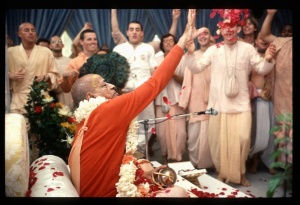CC Antya 4.127: Difference between revisions
m (1 revision(s)) |
(Vanibot #0054 edit - transform synonyms into clickable links, which search similar occurrences) |
||
| (One intermediate revision by one other user not shown) | |||
| Line 1: | Line 1: | ||
{{ | [[Category:Sri Caitanya-caritamrta - Antya-lila Chapter 04]] | ||
<div style="float:left">'''[[Sri Caitanya-caritamrta|Śrī Caitanya-caritāmṛta]] - [[CC Antya|Antya-līlā]] - [[CC Antya 4|Chapter 4: Sanātana Gosvāmī Visits the Lord at Jagannātha Purī]]'''</div> | |||
<div style="float:right">[[File:Go-previous.png|link=CC Antya 4.126|Antya-līlā 4.126]] '''[[CC Antya 4.126|Antya-līlā 4.126]] - [[CC Antya 4.128|Antya-līlā 4.128]]''' [[File:Go-next.png|link=CC Antya 4.128|Antya-līlā 4.128]]</div> | |||
{{CompareVersions|CC|Antya 4.127|CC 1975|CC 1996}} | |||
{{RandomImage}} | |||
==== TEXT 127 ==== | ==== TEXT 127 ==== | ||
<div | <div class="verse"> | ||
sevaka gatāgati kare, nāhi avasara | :sevaka gatāgati kare, nāhi avasara | ||
tāra sparśa haile, sarva-nāśa habe | :tāra sparśa haile, sarva-nāśa habe mora" | ||
</div> | </div> | ||
| Line 12: | Line 16: | ||
==== SYNONYMS ==== | ==== SYNONYMS ==== | ||
<div | <div class="synonyms"> | ||
''[//vanipedia.org/wiki/Special:VaniSearch?s=sevaka&tab=syno_o&ds=1 sevaka]'' — servants; ''[//vanipedia.org/wiki/Special:VaniSearch?s=gatāgati&tab=syno_o&ds=1 gatāgati] [//vanipedia.org/wiki/Special:VaniSearch?s=kare&tab=syno_o&ds=1 kare]'' — come and go; ''[//vanipedia.org/wiki/Special:VaniSearch?s=nāhi&tab=syno_o&ds=1 nāhi] [//vanipedia.org/wiki/Special:VaniSearch?s=avasara&tab=syno_o&ds=1 avasara]'' — there is no interval; ''[//vanipedia.org/wiki/Special:VaniSearch?s=tāra&tab=syno_o&ds=1 tāra] [//vanipedia.org/wiki/Special:VaniSearch?s=sparśa&tab=syno_o&ds=1 sparśa] [//vanipedia.org/wiki/Special:VaniSearch?s=haile&tab=syno_o&ds=1 haile]'' — if I touch them; ''[//vanipedia.org/wiki/Special:VaniSearch?s=sarva&tab=syno_o&ds=1 sarva]-[//vanipedia.org/wiki/Special:VaniSearch?s=nāśa&tab=syno_o&ds=1 nāśa] [//vanipedia.org/wiki/Special:VaniSearch?s=habe&tab=syno_o&ds=1 habe] [//vanipedia.org/wiki/Special:VaniSearch?s=mora&tab=syno_o&ds=1 mora]'' — I shall be ruined. | |||
</div> | </div> | ||
| Line 19: | Line 23: | ||
==== TRANSLATION ==== | ==== TRANSLATION ==== | ||
<div | <div class="translation"> | ||
"The servants are always coming and going without interval. If I touch them, I shall be ruined." | |||
</div> | </div> | ||
| Line 26: | Line 30: | ||
==== PURPORT ==== | ==== PURPORT ==== | ||
<div | <div class="purport"> | ||
Herein it is very clearly indicated that priests performing Deity worship should be careful to keep themselves completely pure and not be touched by outsiders. Sanātana Gosvāmī and Haridāsa Ṭhākura, thinking themselves mlecchas and yavanas because of their past association with Muslims, did not enter the temple or even travel on the path in front of the temple gate. It is customary for the priests of temples in India not even to touch outsiders or enter the Deity room after having been touched. This is a very important item in temple worship. | Herein it is very clearly indicated that priests performing Deity worship should be careful to keep themselves completely pure and not be touched by outsiders. Sanātana Gosvāmī and Haridāsa Ṭhākura, thinking themselves ''mlecchas'' and ''yavanas'' because of their past association with Muslims, did not enter the temple or even travel on the path in front of the temple gate. It is customary for the priests of temples in India not even to touch outsiders or enter the Deity room after having been touched. This is a very important item in temple worship. | ||
</div> | </div> | ||
__NOTOC__ | |||
<div style="float:right; clear:both;">[[File:Go-previous.png|link=CC Antya 4.126|Antya-līlā 4.126]] '''[[CC Antya 4.126|Antya-līlā 4.126]] - [[CC Antya 4.128|Antya-līlā 4.128]]''' [[File:Go-next.png|link=CC Antya 4.128|Antya-līlā 4.128]]</div> | |||
__NOTOC__ | |||
__NOEDITSECTION__ | |||
Latest revision as of 20:31, 19 February 2024

A.C. Bhaktivedanta Swami Prabhupada
TEXT 127
- sevaka gatāgati kare, nāhi avasara
- tāra sparśa haile, sarva-nāśa habe mora"
SYNONYMS
sevaka — servants; gatāgati kare — come and go; nāhi avasara — there is no interval; tāra sparśa haile — if I touch them; sarva-nāśa habe mora — I shall be ruined.
TRANSLATION
"The servants are always coming and going without interval. If I touch them, I shall be ruined."
PURPORT
Herein it is very clearly indicated that priests performing Deity worship should be careful to keep themselves completely pure and not be touched by outsiders. Sanātana Gosvāmī and Haridāsa Ṭhākura, thinking themselves mlecchas and yavanas because of their past association with Muslims, did not enter the temple or even travel on the path in front of the temple gate. It is customary for the priests of temples in India not even to touch outsiders or enter the Deity room after having been touched. This is a very important item in temple worship.